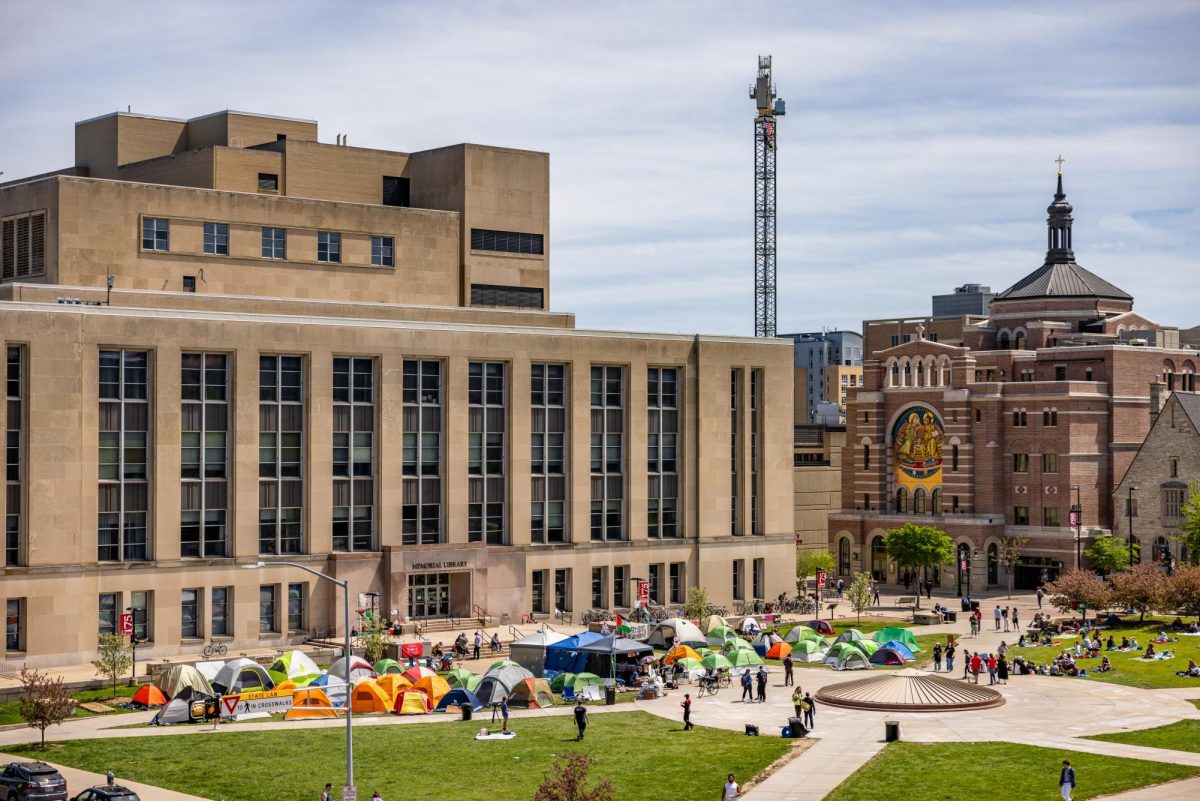
During the semester, buildings on the University of Wisconsin campus are filled with 18- to 25-year-olds, many of whom are more interested in what they are doing after classes than during them.
However, for four days over the summer, the campus is filled with a different kind of student — 7 to 14-year-old kids and their grandparents.
These families are attending Grandparents University, an event held by the Wisconsin Alumni Association and the Family Living Projects of UW Extension. The program celebrated its tenth anniversary this year, and WAA spokesperson Kate Dixon said it’s come a long way in that time.
Dixon said the original program in 2001 contained only four potential classes — called majors — and drew only 160 attendees, a fraction of the more than 800 students today. The program is open to anyone with grandchildren, Dixon said, though the WAA does like to see UW alumni returning through this program.
In fact, she added, the program was initially founded with the hope of connecting alumni back to their alma mater. Today, however, connecting residents to the state is just as important, she said.
The program offers 18 majors today, which range from wildlife ecology to digital storytelling to microbiology. Dixon said the material can sometimes be at a very high level of comprehension.
“It’s some of the same stuff that college students are learning,” she said.
Mark Anthony Rolo, a UW lecturer in the school of human ecology, said he approached his digital storytelling class at Grandparents University in the same way he approached teaching a college class.
In fact, according to Rolo the major difference between teaching a GPU class and a UW class is, “No attitude.” He went on to say he had high hopes for his class.
“I’m excited that they’re really highly motivated,” he explained. “Very creative.”
In Rolo’s class, families used a digital program to tell a three to five minute story on the subject of their choice.
The first day of the two-day class was spent familiarizing the class with the software. In introductions, many grandparents said they were nervous about using the technology. Grandmother Shari Cope of Traverse City, Mich., was one of those grandparents. She said coming into the class she was not sure they would be able to teach her to use the program.
She said, though, between Rolo and her granddaughter Elise Hokonson, she was learning the program, “pretty well.”
“[Hokonson] teaches me,” Cope said.
This year was Hokonson’s second year at GPU. She said last year she came with her other grandparents and majored in microbiology. Although she had a good time both this year and last year, she was let down because she has never had her first choice of majors. Every year she has signed up for veterinary medicine, but she has never been placed there.
Dixon said vet medicine has consistently been one of the most popular majors over the years, along with dairy science.
Attendees of GPU are not only entertained by their classes, their three and a half hours of class every day are supplemented by field trips to many popular Madison destinations. Families toured the UW Arboretum, the Kohl Center, the State Capitol and the Veterans Museum, among other places.
The program is also growing beyond UW. Dixon said though the UW program was the first program of its kind, many schools, including Michigan State and Oklahoma State have now adopted similar schools.
Both Rolo and Dixon said one of the highlights of this program is seeing the interaction between the grandparents and grandchildren. Dixon said she thought the unique interaction between the generations is something kids do not always get, and she is glad GPU can provide it. Rolo said that dynamic was one of the reasons he liked teaching at GPU.
“I think a lot of these older folks are learning through their grandchildren,” Rolo said.
During the semester, buildings on the University of Wisconsin campus are filled with 18- to 25-year-olds, many of whom are more interested in what they are doing after classes than during them.
However, for four days over the summer, the campus is filled with a different kind of student — 7 to 14-year-old kids and their grandparents.
These families are attending Grandparents University, an event held by the Wisconsin Alumni Association and the Family Living Projects of UW Extension. The program celebrated its tenth anniversary this year, and WAA spokesperson Kate Dixon said it’s come a long way in that time.
Dixon said the original program in 2001 contained only four potential classes — called majors — and drew only 160 attendees, a fraction of the more than 800 students today. The program is open to anyone with grandchildren, Dixon said, though the WAA does like to see UW alumni returning through this program.
In fact, she added, the program was initially founded with the hope of connecting alumni back to their alma mater. Today, however, connecting residents to the state is just as important, she said.
The program offers 18 majors today, which range from wildlife ecology to digital storytelling to microbiology. Dixon said the material can sometimes be at a very high level of comprehension.
“It’s some of the same stuff that college students are learning,” she said.
Mark Anthony Rolo, a UW lecturer in the school of human ecology, said he approached his digital storytelling class at Grandparents University in the same way he approached teaching a college class.
In fact, according to Rolo the major difference between teaching a GPU class and a UW class is, “No attitude.” He went on to say he had high hopes for his class.
“I’m excited that they’re really highly motivated,” he explained. “Very creative.”
In Rolo’s class, families used a digital program to tell a three to five minute story on the subject of their choice.
The first day of the two-day class was spent familiarizing the class with the software. In introductions, many grandparents said they were nervous about using the technology. Grandmother Shari Cope of Traverse City, Mich., was one of those grandparents. She said coming into the class she was not sure they would be able to teach her to use the program.
She said, though, between Rolo and her granddaughter Elise Hokonson, she was learning the program, “pretty well.”
“[Hokonson] teaches me,” Cope said.
This year was Hokonson’s second year at GPU. She said last year she came with her other grandparents and majored in microbiology. Although she had a good time both this year and last year, she was let down because she has never had her first choice of majors. Every year she has signed up for veterinary medicine, but she has never been placed there.
Dixon said vet medicine has consistently been one of the most popular majors over the years, along with dairy science.
Attendees of GPU are not only entertained by their classes, their three and a half hours of class every day are supplemented by field trips to many popular Madison destinations. Families toured the UW Arboretum, the Kohl Center, the State Capitol and the Veterans Museum, among other places.
The program is also growing beyond UW. Dixon said though the UW program was the first program of its kind, many schools, including Michigan State and Oklahoma State have now adopted similar schools.
Both Rolo and Dixon said one of the highlights of this program is seeing the interaction between the grandparents and grandchildren. Dixon said she thought the unique interaction between the generations is something kids do not always get, and she is glad GPU can provide it. Rolo said that dynamic was one of the reasons he liked teaching at GPU.
“I think a lot of these older folks are learning through their grandchildren,” Rolo said.

















